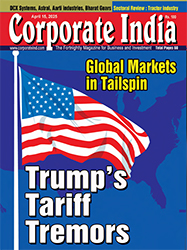Want to Subscribe?
Read Corporate India and add to your Business Intelligence

![]() Unlock Unlimited Access
Unlock Unlimited Access

Finance
Published: May 19, 2023
Updated: May 19, 2023
In a move that will impact travellers and international online shoppers, the Indian government has recently announced the introduction of a 20% Tax Collected at Source (TCS) on all credit card transactions made abroad. Effective from July 1, 2023, this measure aims to regulate foreign remittances and generate additional revenue. This article delves into the implications of the new policy and its impact on various use cases.
To grasp the concept, it is essential to differentiate between Tax Deducted at Source (TDS) and Tax Collected at Source (TCS). TDS is deducted by employers on employees' salaries, while banks deduct TDS on fixed deposit interest. On the other hand, TCS is collected by the seller at the point of sale, and in this case, banks collect TCS on foreign remittances made through credit cards.
Eg- Consider Hussain , who recently travelled to Dubai using his credit card. He utilized his card for various expenses like hotel bills, shopping, restaurants, and transportation, totaling ₹2.5 lakh. As per the new regulation, Hussain would have to pay 20% TCS, which amounts to ₹50,000. This additional charge must be paid upfront, and the credit card issuing bank will deposit the TCS against Shubham's PAN (Permanent Account Number). Shubham can later claim or adjust this TCS when filing his income tax returns.
In another scenario, Alia subscribed to music streaming services from the UK and purchased a software-as-a-service (SaaS) product from the US. Interestingly, all these transactions were made while she was in India, but the new TCS policy mandates a 20% charge on all international transactions. This means that even for digital services consumed within India, individuals will now have to bear the additional TCS cost.
Nishant planned to book a honeymoon trip package to the Maldives and received a quote of
₹5 lakh from a travel agency based in India. It's important to note that the new TCS policy
does not directly apply to this situation as the transaction is made with an Indian travel
agency. However, individuals should be aware that the overall cost of travel may be
indirectly impacted by the TCS levied on other components, such as flight bookings or hotel
stays.
The introduction of a 20% TCS on all international credit card transactions will undoubtedly
make foreign travel and online purchases more expensive for Indian consumers. The upfront
payment of TCS, which can only be adjusted during income tax filing, adds an immediate
financial burden. As individuals plan their international trips or engage in cross-border online
transactions, it is crucial to consider this additional cost and budget accordingly. This policy
change underscores the government's efforts to regulate foreign remittances and generate
revenue, but it also necessitates greater financial planning and awareness among
individuals engaging in international transactions.

April 15, 2025 - First Issue

Industry Review

Want to Subscribe?
Read Corporate India and add to your Business Intelligence

![]() Unlock Unlimited Access
Unlock Unlimited Access
Lighter Vein

Popular Stories
Archives
